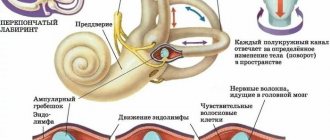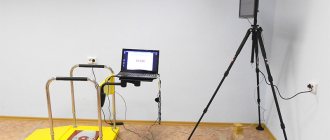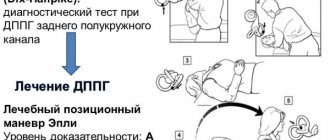Dizziness is the perception of your body in space that does not correspond to reality. This is a fairly common symptom of both neurological and mental and somatic diseases. An average of 15–35% of the population experiences dizziness over their lifetime. Most often these are people over 60 years old - 20%, after 70 - 30% and after 80 - 50%.
Regular attacks of dizziness when standing up
significantly worsen the quality of life and can lead to injury due to a fall. This is especially dangerous for the elderly. For people of working age, such manifestations in the body often cause a temporary loss of the ability to work fully.
Conventionally, there are 5 main types of dizziness
:
- vestibular;
- lipothymic;
- postural;
- cervicogenic;
- psychogenic.
Vestibular vertigo develops due to damage or physiological stimulation of the peripheral vestibular apparatus and central autonomic structures. As a rule, difficulties with orientation in space arise when rotating the head. All this occurs with loss of balance, periodic falls, nausea and other unpleasant symptoms.
Lipotymic dizziness occurs during presyncope after excessive use of insulin or insulinoma. A characteristic symptom is “fog” in the head. A similar condition can occur after taking medications that depress the central nervous system. For example, tranquilizers.
Postural dizziness occurs due to various walking disorders.
Cervicogenic dizziness is provoked by diseases of the cervical spine. Dizziness with this pathology is a consequence of pain and limited mobility of the neck.
Psychogenic dizziness is typical for people with neuroses and personality disorders. Such attacks occur due to feelings of anxiety, panic attacks in various situations. This type is usually described as a feeling of instability, heaviness in the head, and a feeling of intoxication. In this case, there are no oscillatory eye movements, but, unlike other varieties, depression may occur afterwards. Treatment of dizziness in women
and men includes psychotherapy, vestibular exercises, and antidepressants.
Symptoms of dizziness and balance problems
People who experience dizziness often describe their condition as follows:
- feeling of body movement;
- loss of balance and body tilt to one side;
- feeling of tension, squeezing in the head;
- falling for no reason;
- unsteady gait or loss of her confidence.
Symptoms may only become more pronounced when changing body position or rotating the head. Dizziness can come on suddenly and be so severe that you need to sit or lie down quickly. It can last a day or even several, although more often it is limited to a few minutes.
Causes of dizziness
There are many causes of dizziness, from diseases of the inner ear to taking certain medications. The most serious are defined by pathologies of blood circulation in the brain, also these are tumors or brain damage after falls or strong blows.
In many situations, the causes of severe dizziness
become diseases of the inner ear, benign paroxysmal positional vertigo, Meniere's disease. Ear infections are also often the cause.
Less common causes include vertebrobasilar insufficiency, stroke or intracerebral hemorrhage, multiple sclerosis, vestibular migraine, acoustic neuroma, orthostatic hypotension, hypoglycemia (low blood sugar), anemia (low iron levels), and medications.
Rice. 1. BPPV
Inner ear infections
Vestibular neuritis and labyrinthitis are disorders that result from infections. They cause inflammation of the inner ear or the nerve that connects the inner ear to the brain. After this, the transmission of sensory information from the ear to the brain is disrupted. The result is hearing loss and balance problems.
Inner ear infections are caused by viruses or bacteria. You can find out about the presence of viruses in the body by the symptoms of an internal respiratory tract infection. Its manifestations are noted several weeks before the onset of dizziness. You can get the infection at any age.
Structure and functions of the inner ear
Rice. 2. Ear structure
Anatomy of the ear
The inner ear includes a system of tubes and sacs that are filled with fluid. All this is called a labyrinth, the functions of which are hearing and balance. Sound signals from the labyrinth are transmitted to the brain through the vestibulocochlear nerve with two branches. One transmits messages from the organ of hearing, and the other from the organs of balance.
The brain processes balance signals sent through the vestibular nerve from the right and left ears. When one side is infected, it sends false signals. This is how information is presented that does not correspond to reality, which leads to dizziness.
Vestibular neuritis
(nerve inflammation) affects the branch associated with balance. This leads to dizziness, impaired sense of self in space, sudden movement of the eyeballs with a rapid phase, but no transformations with hearing occur. A person may feel like objects around them are moving, and will usually make mistakes when performing coordination exercises.
Experts also use the term “vestibular neuronitis” (damage to the sensory neurons of the vestibular ganglion). Its symptom is severe, rapidly developing, paroxysmal dizziness. It is often characterized by vomiting and imbalance. Often the development of symptoms of dizziness
precedes ARVI. Sometimes, a few weeks before the full clinical picture, patients may experience short bouts of loss of balance.
Labyrinthitis (inflammation of the labyrinth)
occurs when infection affects both branches of the cochleo-vestibular nerve. Then the hearing changes and attacks of dizziness occur. Even with slight turns of the head, the symptoms become more pronounced. Therefore, some people are forced to support their head with their hands.
Benign paroxysmal positional vertigo (BPPV)
BPPV is one of the most common causes of dizziness
, manifested during sudden movements and head swings. The duration of the state is limited to a few seconds or minutes. It occurs when calcium crystals (otoliths) in the inner ear begin to move. Because of this, the sensation of body rotation occurs.
The causes of BPPV include a history of traumatic brain injury, as well as otitis media. Often the cause of the disease cannot be identified. Then the diagnosis is confirmed by taking a Dix-Hallpike test. To do this, the patient quickly lies down from a sitting position and slightly lowers his head, turned 45 degrees. The test is positive if, a couple of seconds after this, an attack of dizziness and nystagmus occurs.
From 20 to 28% of patients with BPPV report spontaneous resolution of symptoms within up to a month after the onset of dizziness. The disease is benign and recurs within the first 12 months in only 15% of cases.
Rice. 3. Dix-Hallpike test: A – turn the head to the right; B - turn your head to the left.
Treatment of BPPV
Treatment techniques include the Epley maneuver. It allows, by manipulating the head, to move the otolith (crystal) to an insensitive zone - the vestibule of the inner ear.
Rice. 4. Epley maneuver
If the effectiveness of such treatment is low, the patient is additionally prescribed a set of exercises to perform at home. This is Brandt-Deroff gymnastics, according to whose method it is necessary to practice 2-3 times a day for 1 to 3 weeks. Taking medications in this case usually does not give positive dynamics.
Rice. 5. Brandt-Daroff gymnastics
Operations are performed when repositioning techniques do not lead to anything. Surgical interventions carry the risk of complications such as facial nerve injuries and hearing loss.
Possible operations include:
- obstruction of the posterior semicircular canal;
- removal of the vestibular nerve;
- labyrinthectomy;
- selective neurectomy.
Meniere's disease
A disease characterized by repeated attacks of rotational vertigo. They last for several hours and are not without noise in the ears, tinnitus, fullness or distension, as well as hearing impairment. It occurs in approximately 0.2% of the population, usually in people between 40 and 60 years of age. The disease is based on expansion of the endolymphatic system in the inner ear, which leads to degeneration of the labyrinthine receptors.
The disease has the following manifestations:
- dizziness;
- unsteady gait;
- hearing impairment;
- problems with the perception of sounds;
- nausea and vomiting;
- tinnitus.
Treatment of Meniere's disease
Treatment of an attack occurs by taking vestibulosuppressors. Prevention of the disease necessarily includes following a low-salt diet, avoiding alcohol and caffeine, and using betahistine and diuretics.
If the chosen therapy does not lead to positive dynamics, more serious treatment is required. This may involve injecting medications directly into the ear or undergoing surgery.
Diagnosis for dizziness
For dizziness, patients undergo Halmagi tests to identify the level of the vestibulo-ocular reflex. Its violation indicates central and peripheral lesions.
The Halmagi test does not require the use of additional equipment or lengthy preparation. The patient needs to look at the bridge of the nose of the specialist who is sitting opposite. In this case, the doctor holds the patient’s head with both hands and turns it from side to side by 15 degrees. With a normal vestibulo-ocular reflex, the eyes remain looking at a given point. If there is a violation, then the gaze turns along with the turn of the head.
Rice. 6. Halmagi sample
Severe dizziness with repeated bouts of vomiting continues for up to 3-4 days, after which the patient recovers. Recovery can take up to several months. In older people, it usually drags on and is often incomplete. If positive dynamics are not observed within a month, then an MRI of the brain and audiometry should be performed to exclude Meniere’s disease.
Mechanism of occurrence
According to the mechanism of occurrence, dizziness is divided into systemic - associated with the vestibular apparatus, which is responsible for balance, and non-systemic, that is, non-vestibular. Most often the condition belongs to the second type. Such dizziness occurs due to changes in pressure, including when a person lies for a long time and then suddenly begins to move. It is benign and does not belong to pathologies.
True dizziness occurs due to irritation of the vestibular apparatus. It is divided into peripheral and central. The first includes all cases of damage directly to the organs of the vestibular apparatus. This also includes the accumulation of fluid in the labyrinth of the inner ear. The cause of central vertigo is damage to the nerve fibers of the brain responsible for the functioning of the vestibular system.
When should you see a doctor?
You should sound the alarm if dizziness becomes regular or prolonged. Get immediate help if you experience severe dizziness and unsteadiness along with the following symptoms:
- sudden headache;
- painful sensations in the chest area;
- labored breathing;
- numbness or weakness of the limbs;
- fainting;
- fast or intermittent heartbeat;
- slow or slurred speech;
- problems with coordination;
- continued vomiting;
- convulsions;
- sudden hearing loss;
- numbness or facial asymmetry.
Preventive measures
If you detect the problem in time, you can avoid unwanted health complications.
Prevention of diseases accompanied by dizziness includes the following aspects:
- You should regularly be in the fresh air. It is also recommended to ventilate the room before going to bed.
- It is advisable to completely eliminate alcoholic drinks and smoking. Bad habits negatively affect the condition of blood vessels.
- If dizziness appears on a regular basis, there is no need to delay contacting a specialist. Treatment will be more productive if it is started at the beginning of the disease.
- It is necessary to take care to enrich the diet with essential vitamins and minerals. If you can’t diversify your diet, you should take vitamin complexes. Particular emphasis should be placed on vitamins P, C and B.
Treatment of dizziness
Treatment of vestibular neuronitis
Once diagnosed, the patient is hospitalized, but sometimes outpatient treatment is acceptable.
In either case, treatment should be aimed at reducing the degree of dizziness, stopping vomiting and accelerating vestibular compensation.
Symptomatic therapy includes taking vestibular suppressants. For vomiting, injectable forms of drugs are used. The duration of treatment is determined by the complexity of the manifestations of dizziness. However, in most cases they are taken for no longer than 3 days. An additional effect is provided by a course of corticosteroids and antiviral drugs for middle ear infections.
The vestibular apparatus is best stabilized through special gymnastics. At first it may have a negative impact on your well-being, but after 2-3 days the therapy should stabilize the condition. You need to repeat gymnastics at least twice a day.
Tumors of the cerebellopontine angle (acoustic neuroma)
A fairly rare cause of dizziness. It manifests itself as slowly progressive hearing loss and tinnitus. Rotational vertigo is rare, but instability is common. For some time, vestibular disorders may be the only symptom of the disease.
After this, hearing impairment begins to occur. People with this problem need to undergo an MRI of the brain with IV contrast. This will help check the patient for the presence of a tumor in the posterior cranial fossa. If a tumor is found, patients need to consult a neurosurgeon to be referred for surgery.
Rice. 7. Acoustic neuroma
Vertebrobasilar insufficiency and cerebrovascular diseases
It is distinguished by the development of reversible dysfunction of the brain stem, cerebellum and other structures into which blood enters through the basilar and vertebral arteries. Ischemic attacks can manifest themselves due to violations of their patency. The reason is atherosclerotic changes, vascular hypoplasia. Slightly less often, inflammation, extravasal compression of the vertebral artery (in case of neck injury) or artery dissection become a prerequisite.
The key cause of loss of coordination in dizziness
There are problems in the functioning of small arteries with high blood pressure, diabetes mellitus, or two diseases together.
According to statistics, cerebrovascular disorders account for about 6%. The cause of dizziness at normal pressure
can be problems in the functioning of both the labyrinth itself due to problems with blood circulation, and disturbances in the area of various brain systems.
Most patients with vertebrobasilar insufficiency are diagnosed with other neurological symptoms. Separately, dizziness with problems with blood vessels is very rare. In such situations, further diagnosis is required to remove other associated factors.
You should not associate attacks of dizziness when changing the position of your head with compression of the vertebral arteries. Often, the rapid development of severe dizziness along with nausea, vomiting and increased blood pressure can be perceived as a signal of the development of cerebrovascular disease. But it usually increases due to severe dizziness and stress.
If a stroke is suspected, a person must be urgently hospitalized for examination and immediate treatment. In the hospital, an MRI of the brain is performed, which in case of a stroke will show focal damage to the cerebellum or brain stem.
Vestibular migraine
Rice. 8. Aura during migraine
Vestibular migraine is diagnosed quite rarely, although it is regarded as a common cause of recurrent non-positional vestibular vertigo. Its manifestations are dizziness of varying severity combined with migraine and weakness. It can occur both during migraine attacks themselves and in the intervals between them.
The duration of such attacks is from 3–5 minutes to 2–3 hours, sometimes days. They are not accompanied by noise or ringing in the ears, or hearing loss. Such attacks usually recur. The diagnosis of vestibular migraine is made based on the typical clinical picture, as well as in the presence of migraine and after excluding other possible causes of dizziness in women
and men.
Treatment of the disease, as with ordinary migraine, includes 3 stages: elimination of provoking factors, relief of the attack and preventive measures. To eliminate vestibular migraine, take anti-migraine drugs or analgesics, as well as vestibular suppressants. Prevention is necessary for regular and severe attacks of vestibular migraine. Then specialists prescribe β-blockers and tricyclic antidepressants.
Demyelinating diseases (multiple sclerosis)
It happens that dizziness is diagnosed in people with demyelinating lesions of the central nervous system, especially with multiple sclerosis. Diagnostic difficulties may arise when dizziness develops at the onset of the disease without other manifestations or when they are of moderate severity. Dizziness in this case can be of a mixed nature, and can also be characterized by a persistent course. To confirm the diagnosis, the patient needs to undergo an MRI of the brain with IV contrast.
Treatment of multiple sclerosis
The most important thing in treating this diagnosis is the elimination of life-damaging sensations and accompanying disorders: difficulties with coordination, hearing or vision. Treatment is determined by the cause of dizziness in men
and women and the mechanisms of its development. It is important to guarantee the patient’s almost complete independence in everyday life, try to avoid sources of stress and minimize the risks of falls and injuries.
Symptom management includes the use of vestibulolytics. The time of taking them should be short and discussed with a doctor, because inhibition of nerve formations does not allow compensatory changes to develop. The effectiveness of treatment increases with regular exercise and exercises to restore stable functioning of the vestibular apparatus.
Therapy is also important to improve coordination, stabilize gait, and develop skills in a person to avoid problems with balance in the future. Usually, physical therapy is used for this, which not only reduces discomfort, but also gives independence when moving.
How to help the body
To treat vertigo, it is necessary to find out the exact cause of the disease. But it is not always possible to do this. After all, you need to undergo many diagnostic measures, examinations, and visit more than one specialist. And the person needs help now, because his condition is getting worse day by day. Nightmares, anxiety, dizziness, nausea - they take you out of balance. Therefore, the doctor can prescribe medications that improve the patient’s condition even before completing a full examination. These will be remedies that relieve stress, eliminate nausea and dizziness. Medicines that improve cerebral circulation will be mandatory.
If dizziness during sleep is diagnosed, the causes of which lie in peripheral vertigo (middle ear problems), surgical intervention may be required. Endolymph drainage, labyrinth surgery, or surgery on the auditory nerve are performed.
The amount of dizziness can be reduced through a properly designed menu. The diet should be designed so that it includes foods rich in iron, magnesium, as well as essential vitamins (C, P, B). You should limit your intake of tea and coffee, it is advisable to give up chocolate and other sweets. Tobacco and alcohol addiction must also be cured. The diet should be aimed at eliminating excess fluid from the body. To do this, reduce the amount of salt and salty foods consumed daily. The total amount of fluid entering the body should not exceed 1.5 liters per day.
Before going to bed, you can take a leisurely walk in the fresh air. It would be better if it was a quiet park. To eliminate dizziness, specially designed rehabilitation exercises performed without overexertion are recommended.









